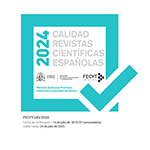Positive parenting, risk and intervention: an analysis of current support mechanisms in Quebec
Abstract
The aim of the article is to clarify, based on a content and interpretative analysis of official documents, the guidance and “underlying logic” governing the operation of positive parenting programmes (Triple P) aimed at families that are vulnerable or in a situation of risk in Quebec (Canada). As in the majority of advanced Welfare States, there has been a rise in the prevalence of these programmes in Quebec during the last fifteen years. However, their development is situated in a specific context that gives a particular shape to their operation. An examination of the three programmes selected for the study enables the detailed description of their points of convergence and divergence, with respect to both the life pathways acting as the basis for their creation and their organisational parameters and intervention philosophy. The interpretative analysis also permits an illustration of the meaning accorded to a range of key concepts that are central to the lines of action within the programmes. The conclusion provides perspective on the treatment accorded to parenting in Quebec, emphasising various aspects of its recent evolution.Downloads
Article download
License
In order to support the global exchange of knowledge, the journal Cuadernos de Trabajo Social is allowing unrestricted access to its content as from its publication in this electronic edition, and as such it is an open-access journal. The originals published in this journal are the property of the Complutense University of Madrid and any reproduction thereof in full or in part must cite the source. All content is distributed under a Creative Commons Attribution 4.0 use and distribution licence (CC BY 4.0). This circumstance must be expressly stated in these terms where necessary. You can view the summary and the complete legal text of the licence.









